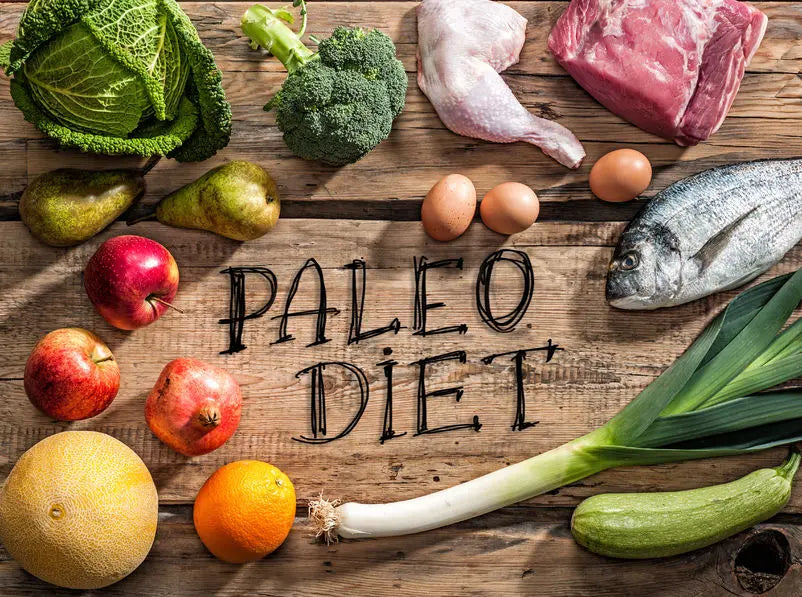
Myths about the Paleo Diet
Share
The Paleo diet is an extremely hot topic lately with almost everyone having an opinion or knowledge on the subject. It is definitely a confusing time, with so much information available to us but also a huge amount of myths doing the rounds. To help, we have put together some of the main myths surrounding the Paleo philosophy, along with the truth to set the record straight. The Paleo diet is a Low Carbohydrate Diet This is perhaps one of the biggest misconceptions of the diet. While there is no strict definition of what a low carbohydrate diet is, most low carbohydrate diets limit all carbohydrate intake to less than 50 grams per day in order to facilitate a state of ketosis. The truth is conventional diets encourage a diet with 50% carbohydrate intake. Unfortunately for our increasingly sedentary Western civilization, this amount of carbohydrates has been proven to be part of the reason for the increase in insulin resistance and diabetes (1). The Paleo diet's focus is not on limiting carbohydrates at all. The focus is on cutting out processed grains that arose out of the agricultural revolution. While this may naturally mean that your overall carbohydrate intake is lowered, other complex carbohydrates like sweet potato, butternut, and other starchy vegetables are encouraged in line with your activity level. The Paleo Diet is Too Expensive to Follow If viewed over the long term, huge savings are made. Savings linked to preventing future chronic illnesses such as insulin resistance, diabetes, and other metabolic disorders are hard to calculate. The truth is that being sick or unwell is costly. If we look at Britain alone, public health care costs due to lifestyle diseases amount to more than 4 billion Pounds annually (2). In America, the burden amounts to over $153 billion per year lost in productivity (3). On an individual level, when you first start following the Paleo diet, things can get expensive. For starters, throwing away mass produced and processed fridge and pantry items which are loaded with sugar and other junk. Next, slowly but surely, replacing these items with artisanal, small batch grocery items. Learning to prepare and cook Paleo food can also be expensive at first. Over a period of time, you will realise though that the costs of setting up and following the Paleo diet are offset later. No more expensive, quick and easy convenience foods when you don't feel like cooking. Certainly no deep fried fast food. No more ice cream, crisps, oven pizzas, sweets and biscuits thrown into the trolley. All that Protein is Bad For Your Kidneys Nope! Not true. Aside from the fact that the Paleo diet is not a 'high protein diet,' there are many studies which conclusively prove that increased dietary protein is not dangerous, especially not for your kidneys. According to the American Journal of Kidney Disease, unless you are elderly or have decreased kidney function, research has proven that too much protein is not exactly dangerous (4). One possible side effect of overdoing the protein is kidney stones. Kidney stones are linked to two main factors, one being dehydration and the other being animal protein intake. Animal proteins contain purines, which are chemical compounds that break down into uric acid. Simply put, eating a diet high in animal protein increases your chances of forming kidney stones, especially if you are not getting enough fluid (5). This is quite simple to prevent; by drinking enough water, you should be fine. Giving up Dairy is Dangerous as I Won't Be Getting Enough Calcium As a child, we are taught that dairy is synonymous with calcium. While the majority of your calcium intake might currently come from dairy, following the Paleo diet means increasing your intake of other foods that are higher in calcium. For instance, nutrient dense foods like sardines and tinned salmon are packed with calcium along with other nutrients like omega-3 fatty acids. Just one cup of fatty fish (including their soft edible bones) will give you 57% of your Recommended Daily Allowance (RDA) (6). Other Paleo approved foods which up your calcium intake include almonds, dark leafy greens, figs and seeds. Going Paleo Means I will Have to Eat Differently From My Family Absolutely not! Going Paleo should be viewed as a long-term journey and not a short-term weight loss fix. The Paleo journey and the associated health benefits are great for the whole family, at any age. By cutting sugar, junk food, soda and other processed foods out of you and your family's lives, you can ensure that you are instilling good food practices and preferences from a young age. In fact, there are various studies that prove that poor nutrition in early childhood often translates to obesity and metabolic issues as an adult (7). Eating all those eggs and all that fat will raise my Cholesterol This is an unfortunate myth, which has been doing the rounds for years. For decades, eggs were demonised and restricted due to their 'cholesterol-raising' capacity. In fact, speak to anyone from the older generation, and he or she will probably still practice caution with their egg intake. Newer research has thoroughly bunked the notion that eggs cause an increase in your cholesterol. Eggs are one of nature's most perfect whole-foods, with an extremely high nutrient density. The interesting turn to all of this is that the nutrients found in eggs lower our risk of heart disease (8). Similarly with the inclusion of full-fat products. For years, low-fat and fat-free products were promoted over full-fat products, and it is only more recently that we are learning that full-fat products are essentially the healthier, more natural option (9).
